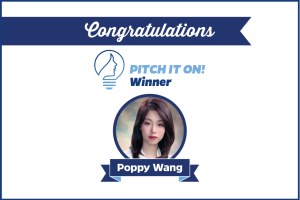
Zhuolun (Poppy) Wang, a Ph.D. candidate in pathology at the Johns Hopkins University School of Medicine, was awarded $15,000 in the fourth annual Pitch It On! competition held by Johns Hopkins Technology Ventures (JHTV). A public showcase of female inventorship at Johns Hopkins, this virtual event reflects JHTV’s efforts to close the entrepreneurship gap in which women are much less likely to be patent holders and startup founders. Out of three pitches, Wang’s Calm technology to address pain management, received the most votes from over 100 attendees.
The finalists this year also included Victoria Osasah, (founder of Motherhood, a mobile app using AI to track, monitor and aid in pregnancies for all, and especially for underserved populations); Nadia Akseer, (founder of Modern Scientist Gear, a sustainable line of lab clothing aimed at the medical and scientific communities), each had 10 minutes to present their technologies.
Melissa Fensterstock, Johns Hopkins alum and company builder at Material Impact Fund, joined us again, and this year Colleen Cutcliffe, also a Johns Hopkins alum and co-founder and CEO of Pendulum Therapeutics, kindly agreed to be the pitch coaches, providing feedback and encouragement to the three finalists.
The event provides the audience with a behind-the-scenes look at the translational funding pitch process, during which a panel of reviewers usually assesses detailed applications behind closed doors. It allows JHTV’s community of faculty members, students, mentors and industry/investor representatives a quick glimpse at what women are building across campus.
Last year’s winner Danielle Nicklas, Founder and CEO of NovvaCup (a reusable menstrual cup: a simple, affordable and sustainable alternative to menstrual products.), announced this year’s winner.
Winning founder Wang is working on a chronic pain management system using gene therapy, something viewed as long overdue by so many who still need to resort to opioids, which come with many unwanted and lingering side-effects. Pain management needs better solutions. “We are so excited to transform studies based on my Ph.D. thesis project to a commercialization pathway that will ultimately help develop truly curative therapies for many chronic pain conditions,” Wang says.
After the event, Wang said, “I always do things a little out of my comfort zone. I get a lot of help and advice along the way and become a little more courageous every time – this has been a recurring theme during my time at Johns Hopkins as an undergraduate or a graduate student. This is how Hopkins makes me grow. When it comes to chronic pain treatment development platforms, the industry doesn’t need more solutions.”
Wang explained her work further, “We have developed a novel gene therapy – CRISPR-induced adenovirus-associated virus (AAV)-delivered loss-of-function modulation and silencing (CALMS) therapy — that harnesses the power of genetics to silence pain at its root. By combining CRISPR gene editing techniques and the FDA-approved AAV-delivery method, we introduce into a patient’s protein-RNA complexes to specifically excise the DNA segments of key pain-mediating receptors in every pain sensing cell via direct nerve root injection. This one-time, minimally invasive injection provides long-lasting, potent analgesic benefits without eliciting the undesired side effects associated with regular pharmaceutical drug regimens. Winning this pitch competition will help us in the initial steps of launching our startup, SereNeuro Therapeutics, such as IP licensing,” Wang added.
“This event reminds me why we do this work,” Executive Director of JHTV, Christy Wyskiel said after Pitch It On! “The quality of ideas, the level of commitment and the clarity of vision from these teams are outstanding. Each of these teams was worthy of funding, as all women featured here will have enormous impact on society.”
Women found almost 40% of companies in the United States annually but receive only 2% of venture funding. At Johns Hopkins, women make up 44% of the faculty but only 11% of startup founders.
Know a Johns Hopkins woman (student, faculty member or staff member) who is breaking major ground in applied research? Nominate her to be featured on the Women in Innovation webpage.